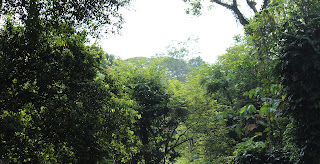Following our memorable visit to Xiamen, PRC last
November to meet our long lost paternal cousins, we recognized that we had to
locate the burial graves of our parental late grandparents here in
Singapore. In the past, our late mother would bring some of us to pay respects dutifully
at their graves during Ching Ming Festival each year some 30 years ago.
Slowly many of us including our late mum neglected these
yearly visits due to personal reasons. In retrospect, someone from the family
should have followed up on these visits to keep in touch with our roots but sadly
none did. Hence we realized dreadfully that
the roots of our family line would be lost forever.
In addition to that, with the recent announcement by
LTA on the mandatory acquisition of partial land of Bukit Brown Cemetery near Lornie Road by
January 2013 for a new expressway, there was a revival of sentiment to locate
the graves of our late grandparents so as to ensure that their graves were not moved
or disturbed without our knowledge.
So with all these reasons led us to one scouting
session in October.
We met on the morning of Oct 26, 2012, the Friday being
a public holiday in Singapore for all who were interested to meet at the main
gate of the cemetery ground.
We were to search amongst the 100,000 graves for the family
name of “Tan” from the district of Tong Ann in Xiamen, the year of demise
believed to be around 1929 or 1933.
With no trace of their actual names or the year proper,
we combed meticulously at every tombstone for the name of our late father
“Cheng Hong” which would be imprinted at the peripheries being names of existing
descendants.
After a few rounds of mistakes and trials and errors,
we begun to streamline and quicken the search by bringing our cars round the
cemetery grounds and would only alight if there were more telltale evidences.
The whole cemetery compound was quite sizeable with many
winding track roads that our hiking of many kilometers on the flat path coupled
the roaming hills made us almost like a passionate golfer seeking intently for
a missing golf ball.
 We quickly found that the entire area had grown
considerably over the years of a long history spanning more than 100 years and
had become a thick forested tropical jungle of numerous huge shady heritage
trees; some so large with their branches so superb that sturdy bird nest ferns
and delicate white orchids with tiny leaves would hang intermittently from
their robust tree trunks.
We quickly found that the entire area had grown
considerably over the years of a long history spanning more than 100 years and
had become a thick forested tropical jungle of numerous huge shady heritage
trees; some so large with their branches so superb that sturdy bird nest ferns
and delicate white orchids with tiny leaves would hang intermittently from
their robust tree trunks.
A bit of the family history for record was that we knew
that our late father was born in 1918 in Tong An near Xiamen, Southern China
and was educated there until he came to Singapore with his parents and two
sisters at the tender age of 8.
The British Empire was ruling Singapore at that time and
our late father’s arrival from China was only documented on 18 August 1947 in a landing
permit card from the Immigration Dept of the Colony of Singapore as seen below.
Grandfather then passed on when my late father
was 15; hence it was believed that GF died around 1933. Two months later, grandmother
passed on too, but she was not buried jointly with her spouse.
Instead her instruction was to have her buried directly
opposite her earlier departed partner, both being buried singly and both buried
facing each other on opposite hills. It seemed that both of our grandparents
had a fierce clash that caused the final decision to be buried separately.
Another point of interest was that earlier in the last
few months, brother in law Francis with his wife, Amy had beforehand visited
the place several times and they had stumbled across many stunning wildlife.
They spotted one monitor lizard of considerable size, some
exotic butterflies in sunset hues and one blue and white colored kingfisher.
Last of all, at long last at noon of that day, we had to suspense the search as all efforts was like hunting for a tiny needle in a haystack or as the Chinese’s saying said: we were like a person seeking for a needle in the wide ocean of the world.
To reward ourselves for our hard work and effort, we proceeded
to a sumptuous lunch nearby, with the thirsty and tired gulping down mugs of cold
beers.
One consolation was that we found that there was one contingency
plan. LTA would cremate the affected graves at their own cost and would keep
the ashes individually in singular urns with proper identifications. Anyone
could then examine these details with greater interest.
A 3 years’ time frame was given to the public to claim
back the ash remains of the affected graves. If no claims were made when the
deadline was due and these urns could not be returned to the rightful descendants,
the unclaimed ashes would be scattered respectfully into the open sea after
some modest religious rituals.

.jpg)






















No comments:
Post a Comment